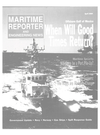
Cool Technology
While debate continues on whether or not fuel cell-based power generation can be a viable proposition for the commercial marine market, its advocates in the engineering industry are making headway in giving practical form to the technology.
The installation of a fuel cell power unit aboard a 12-m (approx. 40- ft) yacht, fully approved and safety-certificated by Germanischer Lloyd, has provided an important, albeit modestlysized, new waterborne platform for the concept.
Using Proton Exchange Membrane (PEM)-type fuel cell modules supplied by Ballard Power Systems of Canada, MTU Friedrichshafen has prepared a complete propulsion system which enables the craft, known as No. 1, to run at seven knots under fuel cell power alone. Installation of the plant was overseen by German power station operator 1PF, owner of the yacht, sailed on Lake Constance, a very large body of water bordered by Germany, Austria and Switzerland.
Given the lake's role as Europe's largest public water supply reservoir, the silent operation and claimed emissionsfree performance of the powering arrangements confer the requisite, exemplary ecological credentials. No l's plant is an electric hybrid system consisting of multiple fuel cell modules, lead-gel accumulators, and electric drive motor, plus the hydrogen tanks for feeding the fuel cell, and a quantity of electronic control and monitoring equipment.
The CoolCell system, so named because of its operation at a relatively low temperature of about 65-degrees Centigrade, compared with the 650- degrees C of the HotModule type, for instance, comprises four modules with a unit electrical output of 4.8-kW. "Even if the yacht market is not yet ready for the wide-scale introduction of fuel cell technology, we want No 1 to be proof of the fact that we are in the position to successfully manufacture mobile fuel cell propulsion systems," said Dr. Rolf A. Hanssen. chairman of MTU Friedrichshafen and head of the DaimlerChrysler Off- Highway business unit. MTU is part of DaimlerChrysler, which also has a 25-percent stake in Ballard. CoolCell is regarded as suitable, in principle, not only for yachts but also for power generation in many other mobile applications, including commercial and military vessels, and for rail transport.
MTU is in the vanguard of fuel cell technology in Europe, and the company's developmental work on commercial marine applications has been undertaken in cooperation with Ballard, which also supplies the modules for the Mercedes Benz A-cIass fuel cell automobiles.
MTU's Hot Module fuel cell, a decentralised and versatile, miniature power station, is expected to be put into series production in 2006, following a growing number of field trial plants at locations in Europe, America and Asia.
Other stories from April 2004 issue
Content
- Rocknes Successfully Parbuckled page: 8
- Galtex Pilots Order New Jet Boat page: 9
- Meyer Werft Delivers New RoRo-Cruise Ferry page: 10
- Bollinger Launches Innovative OSV Hull page: 12
- Port Pile Up? page: 14
- U.S. Manifest Presentation Requirements page: 17
- Terrorist and Bogus Marine Credentials page: 23
- Rig Demand in the Doldrums page: 24
- The Future is Now page: 30
- SNAME: Investing in the Future page: 32
- Offshore Prospects Keep Bollinger Busy page: 34
- Bollinger Delivers ATB for Bouchard page: 34
- ShipConstructor 2 0 0 4 used for M/V Cheramie BoTruc 38 page: 36
- Stability Software for Semi Submersible Rigs page: 38
- VT Halter: King has Company Back on Track page: 40
- Teekay Enters LNG With Tapias Acquisition page: 42
- Drewry Forecasts Strong LNG Growth page: 42
- ChevronTexaco to Operate New LNG Carrier page: 43
- ABS Addresses Tech Concerns page: 44
- Dual-fuel Diesel Engines for LNG Carriers page: 46
- Graig Extends Cooperation With Vinashin page: 49
- Teekay Seeks to Grow Suezmax Fleet page: 50
- SMT: Safe and Cost Effective Mooring page: 50
- Wilh. Wilhelmsen ASA: Profits to Roll Through 2004 page: 52
- Farstad: North Sea Utilization Rates Down page: 54
- ConCat Survey Cat Trolls for Buyers page: 55
- Berge Boston Gets New Ship Security System page: 56
- Kongsberg Maritime: United, Diverse page: 57
- The Rules are About to Change page: 60
- Cool Technology page: 62
- Advanced Joint Health Service Support and Sea Basing Concept page: 64

